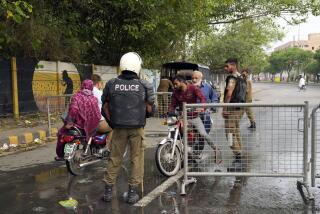U.S. May Be Holding Pakistani Journalist
- Share via
PESHAWAR, Pakistan — The family of a Pakistani journalist kidnapped in December said Thursday that they believe he could be in U.S. custody.
Hayatullah Khan was abducted at gunpoint in the volatile North Waziristan tribal region Dec. 5 by armed, masked men whom a witness at the time described as dressed like fighters from the ousted Taliban regime of Afghanistan. But Ihsanullah Khan, the victim’s brother, said that senior officials from Pakistan’s intelligence agencies had told the family that Hayatullah was now beyond their jurisdiction.
“We were told a few days ago that Mr. Khan was no longer in their possession. He might be somewhere in Pakistan or the United States being grilled for his possible links with Al Qaeda,” Ihsanullah Khan said, citing information passed to him by unnamed intelligence officials.
“Earlier these [officials] told us that Hayatullah was fine and we should not worry about him. But now they say that Hayatullah might be in U.S. officials’ custody,” he said.
In Washington, a Pentagon spokesman said the report could not be confirmed.
Hayatullah Khan came to wide public attention when he reported allegations that a suspected Al Qaeda operative and four other people in the town of Asoray, including a 7-year-old boy, had been killed by a U.S. missile attack -- not an accidental munitions explosion, as Pakistani officials had asserted.
Khan quoted local tribesmen as saying that the mud-brick compound where Egyptian Abu Hamza Rabia died Dec. 1 had been hit by an air-launched missile. He photographed metal fragments at the compound that appeared to bear markings identifying them as remnants of a U.S. laser-guided Hellfire missile. He was working for the European Pressphoto Agency and two Pakistani newspapers when he was kidnapped in the town of Mir Ali, which, like Asoray, is near the Afghan border.
Pakistani officials insisted that the compound had not been attacked. American counterterrorism operations in Pakistan are a matter of great sensitivity for the government of President Pervez Musharraf, whom some accuse of being too accommodating of U.S. interests.
Authorities say that Khan’s abduction was not related to any news report but rather sprang from a personal matter. His family said they have had no contact from his kidnappers.
They also deny that Khan had any connection to Al Qaeda or the Taliban.
Ihsanullah Khan said intelligence officials told him his brother “was being grilled by the U.S. to confirm the death of Hamza Rabia in the missile attack.”
Meanwhile, the Pakistani government Thursday lodged a protest with Afghanistan over the killings of 17 Pakistani men near the border town of Spin Buldak, in Afghanistan’s Kandahar province, on Wednesday. Afghan authorities described the men as Taliban rebels.
Pakistani Foreign Office spokeswoman Tasneem Aslam said that the Afghan ambassador in Islamabad was summoned to hear an official protest over the incident. “We have asked Afghan authorities to investigate the matter and tell us how these innocent Pakistani civilians were killed by Afghan forces,” she said.
Pakistan’s interior minister, Aftab Sherpao, said that the 17 Pakistani tribesmen “went to Afghanistan to take part in Nowruz, a religious festival of the Shiites, but were killed by Afghan forces in a fake encounter and were labeled as Taliban.”
The bodies were brought back to Chaman and Quetta in Pakistan and buried Thursday.
The incident has further fueled tensions between the neighboring countries following weeks of back-and-forth accusations of border infiltrations.
Afghan President Hamid Karzai last month handed over a list of Taliban leaders who Afghan authorities believed were in Pakistan.
Ali reported from Peshawar and Zaidi from Islamabad.
More to Read
Sign up for Essential California
The most important California stories and recommendations in your inbox every morning.
You may occasionally receive promotional content from the Los Angeles Times.










